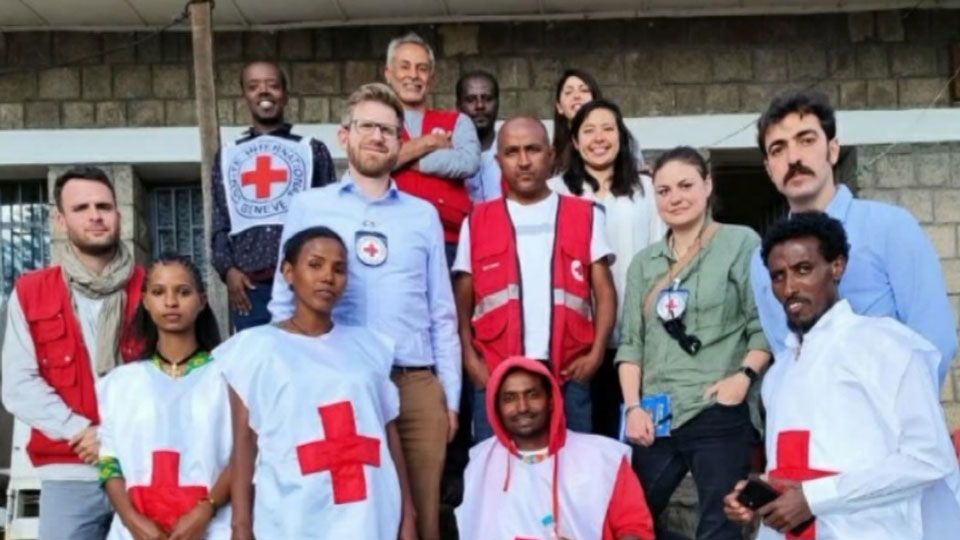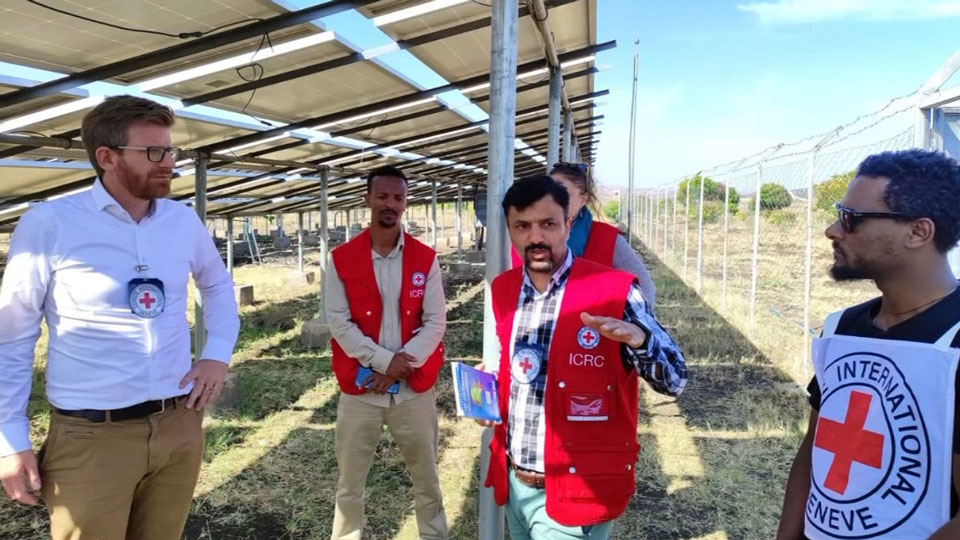"Japan plays an important role to... support the work of organizations such as the International Committee of the Red Cross financially. We very much appreciate the support. But it's also an important voice in the international community to stand up for international humanitarian law and its respect and its promotion also in places that are facing conflict," he said.
Schüepp's March visit followed the release of an ICRC statement in which it noted suffering in the Gaza Strip: "This brutal war has ruptured any sense of a shared humanity." The organization has been working in conflict zones for over 160 years.
On the frontline
The ICRC's work is based on the Geneva Conventions of 1949, ensuring humanitarian protection and assistance for victims of armed conflict and other violent situations. Its activities include protecting civilians, helping detainees, and reuniting families separated in conflicts. The group's emblems — the red cross, red crescent, and red crystal — provide protection for relief workers in conflict zones.
Schüepp said the ICRC was currently dealing with more than 100 conflicts around the world. While providing humanitarian assistance "is of course one thing that we do," he called for those involved in fighting to minimize the impact on others.
"It's... key that all belligerents, everybody fighting in a conflict wherever they are, takes all measures to better protect and respect those who are not fighting, better respect and protect civilians, prisoners, in order to avoid some of the consequences that we see today."
Facilitating hostage release
Last year, the organization's long, neutral standing in the Middle East was instrumental in securing a release of hostages in the Israel/Hamas conflict. In November 2023, teams from the ICRC began a multi-day operation to facilitate the release and transfer of hostages held in the Gaza Strip, and of Palestinian detainees to the West Bank.

Schüepp explained how the ICRC operates in such a scenario: "It's the parties, together with mediators, who negotiate. If we're then asked to help implement agreements, humanitarian in nature, we are of course, then, ready to facilitate such an agreement.
"We need to build trust and the dialogue with the parties to the conflict, so that they understand who we are, what we do, and why we provide neutral and impartial independent humanitarian aid and why they should allow us and support us in reaching the populations."
However, the hostage situation has seen little progress since the release last year. Schüepp told NHK World about the current operational difficulties.
"The ICRC has been working in Israel and the occupied territories for many decades... including visiting many persons held in Israel. Unfortunately, we currently are not able to conduct these visits and it will be important for us to be able to visit all those being held," he said.
Meanwhile, a humanitarian crisis in the region is deepening. UNICEF reports that one in three children under two years of age in northern Gaza suffer from acute malnutrition. It's calling for the opening of multiple land border crossings into the enclave, to allow reliable delivery of aid on a large scale.
"It's hard to describe in words," said Schüepp. "You have an estimated 1.7 million people in the smallest of places with very, very little supplies to actually tend to their basic needs. Water, food, healthcare, are all at extremely critical levels. And so our teams, we have about 130 people on the ground, work day in and day out to do what they can to address the situation: operating in the hospital, facilitating water tracking, but it's by far not enough."
"Forgotten crisis"
Schüepp has been working at the ICRC for 17 years. He was in charge of its operations in Ukraine and Russia when Russia invaded Ukraine. He now oversees the organization's activities across the globe.
"There are very few jobs in this world that can be more rewarding than the one that I have, even if it deals on a daily basis with the horrors of war," he said.
"In many places affected by conflict, you also see on the one hand how people find ways to cope with their situation, how humanity can prevail, and also how we can help when we are able to reunite families, sometimes after years of separation, or were able to provide what is often a little bit of aid in the most destitute places."
The ICRC is active in more than 100 countries. Nearly 40 percent of the work is concentrated in Africa.
"Unfortunately, many countries in the African continent remain heavily affected by the combined effects of conflicts, but also climate change, and often also very much out of the limelight," said Schüepp. "We speak about a forgotten crisis."
According to a report by the UN human rights office, the armed conflict in Sudan has resulted in thousands of civilians killed, and more than 6.7 million people forced to flee their homes. In Ethiopia, too, millions have been displaced by fighting. Food security worsened by severe droughts exacerbates people's already dire situation.
In January, Schüepp visited Sudan and Ethiopia, where the ICRC has reinforced its assistance, including water and food supply, access to health care, and other essential services.


He observed many problems that compounded the humanitarian crisis in the region: armed conflict, displacement, land littered with weapons, and the loss of arable land leading to lost income and famine.
A call for political will
As the ICRC deals with the consequences of conflict, Schüepp underscores a global political responsibility to address the root causes of humanitarian crises.
"It is clear that ending conflicts is difficult and it requires, at the end of the day…political will," he said. In the meantime, "the ICRC remains present on both sides of the conflict, always with... the unique humanitarian goal to be impartially assessing who is in most urgent need of support and providing support."
While Japan remains a key donor, the ICRC faces budgetary constraints as other nations cut back on contributions amid financial and economic trends. The organization is being forced to refocus on its core humanitarian activities that, according to Schüepp, are rooted at a community level.
"I speak a lot about humanity simply because that's what we cannot forget. It is easy to be frustrated and despairing about the levels of violence and hopelessness that we see on screens. At the same time, it's even more important than ever to also remind ourselves of our common humanity," he told NHK World.
"Our common humanity brings us together across the divides of conflict. We need to influence where we can, which is also often in our surroundings, in our communities, and even though many of us live in peaceful communities, supporting each other is where this starts."


